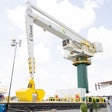
A new report from ABB Motion titled "Circularity: No Time to Waste" highlights that 92% of industrial businesses in the U.S. are currently affected by resource scarcity, leading to increased costs, supply chain disruptions, and production slowdowns. This situation is driving a significant 67% of these businesses to heighten their investment in circularity initiatives over the next three years.
The report, based on a global survey conducted by Sapio Research in October 2023, included responses from 3,304 industrial decision-makers across 12 countries, with 400 respondents from the U.S. These businesses span various industries, including energy, metals, chemicals, oil and gas, and utilities.
Key findings reveal that raw materials (39%), labor (35%), and electronic components (33%) are perceived as the most scarce resources. Additionally, 39% of businesses report increased operational costs due to resource scarcity, 39% experience supply chain disruptions, and 29% face production capacity slowdowns. Notably, despite energy being a scarce resource, over 40% of businesses identified it as their biggest source of waste, underscoring the critical need for enhanced energy efficiency.
The survey identified several challenges to implementing circularity. A major obstacle is the absence of a universally accepted definition of "circularity," with only 14% viewing it as a company-wide responsibility. However, those that do adopt this broader responsibility report significant improvements in energy consumption, use of recycled materials, and carbon emissions.
In the U.S., limited adoption of key circular practices is evident, including partnering with waste management companies (41%), incorporating energy-efficient technologies (37%), and promoting circular principles in supply chains (36%). On a positive note, 81% of businesses are using recycled materials in their products to some extent.
Businesses investing in circularity are already seeing benefits, including waste reduction (44%) and energy efficiency improvements (49%). Though concerns about upfront investments exist, many anticipate long-term enhancements in process efficiency and cost management.
The vast majority of respondents (84%) believe that a circular economy fosters innovation and competitiveness. They support increased regulation and reporting requirements (80%) and advocate for more government support in adopting circular business practices (82%).
Tarak Mehta, President of ABB Motion, emphasized the urgent need for a transition to a circular economy, noting the unsustainable depletion of resources and its contribution to emissions and climate change. He advocates for a holistic approach, integrating responsibility at all organizational levels, and adopting new technologies and collaborations. He stresses that businesses embracing circularity can gain significant benefits, from cost control to improved reputation, and urges immediate action to make circularity a norm in global industries.















